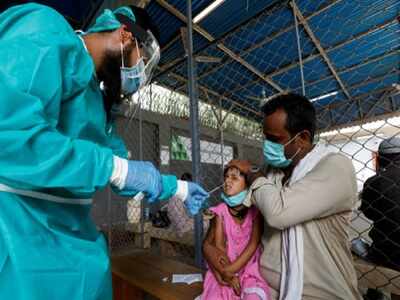
NEW DELHI: Pakistan's coronavirus situation, 26/11 mastermind Hafiz Saeed and Indian national Kulbhushan Jadhav dominated the headlines across the border last week.
Pakistan Ulema Council's "support" to the construction of Islamabad's first Hindu temple also caught the Pakistani media's attention.
Pakistan Ulema Council's "support" to the construction of Islamabad's first Hindu temple also caught the Pakistani media's attention.
Here's what made news in Pakistan and why:
1
Pakistan's coronavirus cases cross 250,000-mark
Pakistan's number of coronavirus cases on Monday crossed the 250,000-mark after 2,769 new infections were detected in the last 24 hours, the Pakistani health ministry said.
According to the ministry of national health services, 69 more persons died taking the death toll to 5,226. Another 1,837 patients were in critical condition.
The rate of recovery was improving and so far 161,917 patients have recovered across the country.
Out of the total 251,625 infections, Sindh has reported 105,533 cases, Punjab 87,043, Khyber-Pakhtunkhwa 30,486, Islamabad 14,108, Balochistan 11,185, Gilgit-Baltistan 1,671 and Pakistan-occupied Kashmir 1,599.
A total of 1,585,170 tests have been conducted, including 22,532, in the last 24 hours.
According to the ministry of national health services, 69 more persons died taking the death toll to 5,226. Another 1,837 patients were in critical condition.
The rate of recovery was improving and so far 161,917 patients have recovered across the country.
Out of the total 251,625 infections, Sindh has reported 105,533 cases, Punjab 87,043, Khyber-Pakhtunkhwa 30,486, Islamabad 14,108, Balochistan 11,185, Gilgit-Baltistan 1,671 and Pakistan-occupied Kashmir 1,599.
A total of 1,585,170 tests have been conducted, including 22,532, in the last 24 hours.
2
Bank accounts of Hafiz Saeed, his aides restored after approval from UN sanctions committee
Pakistan has restored the bank accounts of the outlawed Jamaat-ud-Dawa (JuD) chief and the 2008 Mumbai terror attack mastermind Hafiz Saeed and his four top aides, according to a report in The News.
Saeed, a UN designated terrorist whom the US has placed a $10 million bounty on, was arrested on July 17 last year in the terror financing cases. He was sentenced to 11 years in jail by an anti-terrorism court in February this year in two terror financing cases. He is lodged at Lahore's high-security Kot Lakhpat jail.
Abdul Salam Bhuttavi, Haji M Ashraf, Yahya Mujahid and Zafar Iqbal - all on the UN Security Council's terrorists list – were the other members of the JuD and Lashkar-e-Taiba who got their bank accounts restored, The News reported.
The report claimed that each one of the defunct JuD leader had appealed to the United Nations for restoring their bank accounts so that they could run their family affairs.
His bank accounts were frozen by the Pakistani government complying with the UNSC resolution.
Saeed, a UN designated terrorist whom the US has placed a $10 million bounty on, was arrested on July 17 last year in the terror financing cases. He was sentenced to 11 years in jail by an anti-terrorism court in February this year in two terror financing cases. He is lodged at Lahore's high-security Kot Lakhpat jail.
Abdul Salam Bhuttavi, Haji M Ashraf, Yahya Mujahid and Zafar Iqbal - all on the UN Security Council's terrorists list – were the other members of the JuD and Lashkar-e-Taiba who got their bank accounts restored, The News reported.
The report claimed that each one of the defunct JuD leader had appealed to the United Nations for restoring their bank accounts so that they could run their family affairs.
His bank accounts were frozen by the Pakistani government complying with the UNSC resolution.
3
Kulbhushan Jadhav refused to seek review of his death sentence, says Pakistan
Pakistan on July 8 said that Indian prisoner on death row Kulbhushan Jadhav has refused to file an appeal in the Islamabad high court against his conviction and subsequent death sentence by a military court despite authorities' offer to do so, according to media reports.
Instead, officials added, Jadhav had decided to apply for a mercy petition, Dawn News reported.
Jadhav, the 50-year-old retired Indian Navy officer, was sentenced to death by a Pakistani military court on charges of "espionage and terrorism" in April 2017. Weeks later, India approached the ICJ against Pakistan for denial of consular access to Jadhav and challenging the death sentence.
The Hague-based ICJ ruled in July last year that Pakistan must undertake an "effective review and reconsideration" of the conviction and sentence of Jadhav and also to grant consular access to India without further delay.
On Wednesday, Pakistan's Additional Attorney General Ahmed Irfan said that on June 17, 2020, Jadhav was offered to file an appeal in the Islamabad High Court for review and reconsideration of his sentence and conviction.
"Exercising his legal right, Commander Jadav refused to file a petition for the review and reconsideration of his sentence and conviction. He instead preferred to follow up on his pending mercy petition," said Irfan, who was addressing a press conference along with Director General (South Asia & SAARC) Zahid Hafeez Chaudhry.
He said the Pakistan government promulgated an ordinance on May 20 to let the Indian government, Jadhav or his legal representative to file a review petition in IHC within 60 days. The ordinance would expire on July 19.
Commenting on Irfan's remarks, the Ministry of External Affairs in New Delhi dismissed his claim as "continuation of farce that has been in play for the last four years."
Noting that Jadhav was sentenced to execution through a farcical trial, the ministry said that he "was coerced to refuse to file review in his case".
Pakistan Ulema Council supports construction of first Hindu temple in Islamabad
An umbrella group of Muslim organisations in Pakistan has extended its support to the construction of the first Hindu temple in Islamabad and denounced the controversy over the issue, according to a media report on Saturday.
The Pakistan Ulema Council (PUC), whose members include Islamic clerics and legal scholars of different Islamic traditions, also said the Constitution of Pakistan categorically defines the rights of Muslims and non-Muslims living in the country, Dawn newspaper reported.
The CII is a constitutional body responsible for giving legal advice on Islamic issues to the Pakistan government.
Pakistan's religious affairs ministry has written to the CII to seek its opinion on the government's funding for the construction of the temple in the capital city amid opposition from some Muslim groups.
Minister of religious affairs Noorul Haq Qadri had last week said there was no problem related to the construction of the temple, but the real issue was whether it could be built with the public money.
The government has approved Rs 10 crore for the Krishna temple, which will come up in a 20,000 sq ft plot in the capital's H-9 administrative division.
Ashrafi said those opposing the construction of the temple have an incorrect interpretation of Sharia (Islamic law).
Instead, officials added, Jadhav had decided to apply for a mercy petition, Dawn News reported.
Jadhav, the 50-year-old retired Indian Navy officer, was sentenced to death by a Pakistani military court on charges of "espionage and terrorism" in April 2017. Weeks later, India approached the ICJ against Pakistan for denial of consular access to Jadhav and challenging the death sentence.
The Hague-based ICJ ruled in July last year that Pakistan must undertake an "effective review and reconsideration" of the conviction and sentence of Jadhav and also to grant consular access to India without further delay.
On Wednesday, Pakistan's Additional Attorney General Ahmed Irfan said that on June 17, 2020, Jadhav was offered to file an appeal in the Islamabad High Court for review and reconsideration of his sentence and conviction.
"Exercising his legal right, Commander Jadav refused to file a petition for the review and reconsideration of his sentence and conviction. He instead preferred to follow up on his pending mercy petition," said Irfan, who was addressing a press conference along with Director General (South Asia & SAARC) Zahid Hafeez Chaudhry.
He said the Pakistan government promulgated an ordinance on May 20 to let the Indian government, Jadhav or his legal representative to file a review petition in IHC within 60 days. The ordinance would expire on July 19.
Commenting on Irfan's remarks, the Ministry of External Affairs in New Delhi dismissed his claim as "continuation of farce that has been in play for the last four years."
Noting that Jadhav was sentenced to execution through a farcical trial, the ministry said that he "was coerced to refuse to file review in his case".
Pakistan Ulema Council supports construction of first Hindu temple in Islamabad
An umbrella group of Muslim organisations in Pakistan has extended its support to the construction of the first Hindu temple in Islamabad and denounced the controversy over the issue, according to a media report on Saturday.
The Pakistan Ulema Council (PUC), whose members include Islamic clerics and legal scholars of different Islamic traditions, also said the Constitution of Pakistan categorically defines the rights of Muslims and non-Muslims living in the country, Dawn newspaper reported.
The CII is a constitutional body responsible for giving legal advice on Islamic issues to the Pakistan government.
Pakistan's religious affairs ministry has written to the CII to seek its opinion on the government's funding for the construction of the temple in the capital city amid opposition from some Muslim groups.
Minister of religious affairs Noorul Haq Qadri had last week said there was no problem related to the construction of the temple, but the real issue was whether it could be built with the public money.
The government has approved Rs 10 crore for the Krishna temple, which will come up in a 20,000 sq ft plot in the capital's H-9 administrative division.
Ashrafi said those opposing the construction of the temple have an incorrect interpretation of Sharia (Islamic law).
4
Pakistan calls for strong cooperative mechanisms to address threat to food security by locusts
Pakistan has said that strong regional and international cooperative mechanisms were vital to address the serious threat posed by desert locusts to the food security of the country and the region.
Minister for national food security and research Syed Fakhar Imam informed that the “current outbreak is the worst in over 25 years and that the pest is migrating towards Pakistan from countries in the region as well as from the Horn of Africa and the Red Sea area, the Foreign Office said.
Imam acknowledged the important contribution of the United Nations Food and Agriculture Organisation (FAO) in extending support to Pakistan.
The National Plan of Action, which was devised in consultation with the provincial governments, was an illustration of the whole-of-government approach and was delivering substantive results, the minister added.
The briefing to members of the diplomatic community and international partners was part of the ongoing efforts, led by Prime Minister Imran Khan, to mitigate the threat of desert locust since the declaration of National Emergency on January 31, 2020.
Minister for national food security and research Syed Fakhar Imam informed that the “current outbreak is the worst in over 25 years and that the pest is migrating towards Pakistan from countries in the region as well as from the Horn of Africa and the Red Sea area, the Foreign Office said.
Imam acknowledged the important contribution of the United Nations Food and Agriculture Organisation (FAO) in extending support to Pakistan.
The National Plan of Action, which was devised in consultation with the provincial governments, was an illustration of the whole-of-government approach and was delivering substantive results, the minister added.
The briefing to members of the diplomatic community and international partners was part of the ongoing efforts, led by Prime Minister Imran Khan, to mitigate the threat of desert locust since the declaration of National Emergency on January 31, 2020.
5
US bans Pakistan's PIA over pilot licence scandal
The United States has banned Pakistan International Airlines from operating chartered flights to the country after the carrier said nearly 150 of its pilots would be grounded over fake or dubious licences.
It follows a similar move by European Union aviation regulators to bar the state-run carrier for six months.
The US Department of Transportation announced the ban after it was made aware that "nearly one-third of Pakistani pilots are not properly certificated in accordance with international standards," it said in a statement dated July 1.
Pakistan's aviation minister revealed in June that a government review had found around 260 of the country's 860 active pilots hold fake licences or cheated on exams.
PIA at the time said it would immediately ground about a third of its 434 pilots, just weeks after one of its planes crashed in Karachi killing 98 people -- an accident blamed on pilot error.
The airline confirmed in a statement that its approval had been revoked due to "recent events identified by the Pakistan Civil Aviation Authority that are of serious concern to aviation safety".
So far 17 pilots have been fired in the first phase of its investigation, a PIA spokesman told AFP.
It follows a similar move by European Union aviation regulators to bar the state-run carrier for six months.
The US Department of Transportation announced the ban after it was made aware that "nearly one-third of Pakistani pilots are not properly certificated in accordance with international standards," it said in a statement dated July 1.
Pakistan's aviation minister revealed in June that a government review had found around 260 of the country's 860 active pilots hold fake licences or cheated on exams.
PIA at the time said it would immediately ground about a third of its 434 pilots, just weeks after one of its planes crashed in Karachi killing 98 people -- an accident blamed on pilot error.
The airline confirmed in a statement that its approval had been revoked due to "recent events identified by the Pakistan Civil Aviation Authority that are of serious concern to aviation safety".
So far 17 pilots have been fired in the first phase of its investigation, a PIA spokesman told AFP.
Download
The Times of India News App for Latest India News

Coronavirus outbreak
Trending Topics
LATEST VIDEOS
India
 Rajasthan political crisis: Rahul, Priyanka in touch with Sachin Pilot
Rajasthan political crisis: Rahul, Priyanka in touch with Sachin Pilot  LAC standoff: Chinese troops vacated finger 4 area around Pangong Tso
LAC standoff: Chinese troops vacated finger 4 area around Pangong Tso  Unlock 2.0: Construction work resumes in Srinagar
Unlock 2.0: Construction work resumes in Srinagar  Google to invest Rs 75,000 crore in India: CEO Sundar Pichai
Google to invest Rs 75,000 crore in India: CEO Sundar Pichai  PL Punia says ‘Sachin Pilot is now in BJP’, later tweets to clarify mistake
PL Punia says ‘Sachin Pilot is now in BJP’, later tweets to clarify mistake  Rare yellow frogs spotted in MP's Narsinghpur district
Rare yellow frogs spotted in MP's Narsinghpur district
More from TOI
Navbharat Times
Featured Today in Travel
Quick Links
Coronavirus in MumbaiCoronavirus in KolkataCoronavirus in HyderabadCoronavirus in DelhiCoronavirus in BangaloreCoronavirus symptomsCoronavirus in IndiaWhat is CoronavirusCoronavirus NewsSolar EclipseNPRWhat is NRCCAB BillCAB and NRCRTI BillPodcast newsLok SabhaShiv SenaYSRCPCongressBJP newsUIDAIIndian ArmyISRO newsSupreme Court
Get the app



